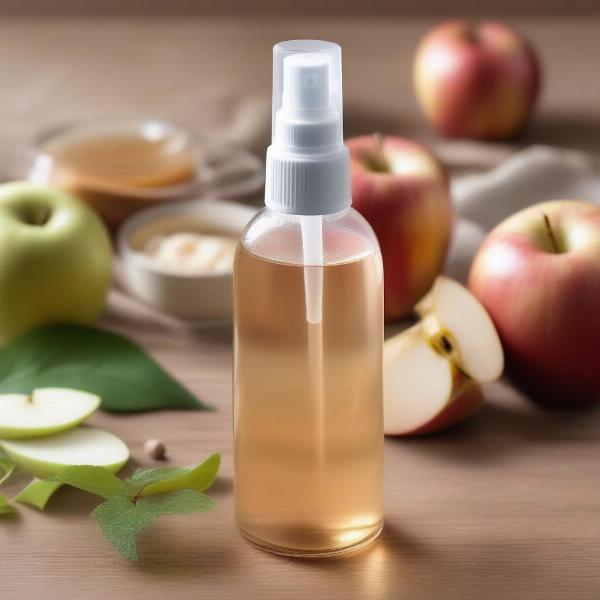Dog odor can be a real challenge for pet owners. Whether it’s a lingering wet dog smell or a more persistent musty odor, finding the right solution can make all the difference in enjoying your furry friend’s company. This guide will delve into the world of dog sprays for smelly dogs, covering everything from choosing the right product to understanding the underlying causes of dog odor. We’ll explore effective solutions and offer practical tips to help you keep your canine companion smelling fresh and clean.
Understanding the Causes of Dog Odor
Before reaching for a dog spray, it’s crucial to understand why your dog might be smelling less than ideal. Common culprits include:
- Skin Infections: Yeast and bacterial infections can produce a distinct, often pungent odor.
- Allergies: Environmental and food allergies can lead to skin irritation and inflammation, which can cause a dog to smell.
- Ear Infections: A yeasty or foul smell emanating from the ears is often a sign of an infection.
- Poor Grooming Habits: Infrequent bathing and brushing can allow dirt, dander, and oils to accumulate, contributing to unpleasant odors.
- Anal Gland Issues: While often overlooked, impacted or infected anal glands can produce a surprisingly strong and unpleasant fishy smell.
- Rolling in Unpleasant Substances: Dogs have a peculiar fondness for rolling in things we find repulsive, from dead animals to garbage.
Choosing the Right Dog Spray for Smelly Dogs
The market offers a variety of dog sprays, each designed with different purposes in mind. Consider these factors when selecting a spray:
- Type of Spray: Deodorizing sprays simply mask odors, while odor-neutralizing sprays work to eliminate them. Some sprays also offer conditioning benefits for the coat.
- Ingredients: Opt for natural, hypoallergenic formulas, especially if your dog has sensitive skin. Avoid sprays containing harsh chemicals or artificial fragrances.
- Scent: Choose a scent you and your dog find pleasant. Keep in mind that strong fragrances can be overwhelming for some dogs.
DIY Dog Deodorizer Options
For those who prefer a more natural approach, several DIY dog deodorizer options are available:
- Apple Cider Vinegar Spray: Dilute apple cider vinegar with water and spray lightly onto your dog’s coat. This can help balance the skin’s pH and reduce odor-causing bacteria.
- Baking Soda Paste: Make a paste of baking soda and water and apply it to your dog’s coat. Let it sit for a few minutes before rinsing thoroughly. This can help absorb odors and freshen the fur.
- Essential Oil Sprays: Certain essential oils, such as lavender and chamomile, can have calming and deodorizing effects. However, it’s crucial to dilute them properly and consult with a veterinarian before using them on your dog, as some oils can be toxic to pets.
 DIY Dog Deodorizer Spray
DIY Dog Deodorizer Spray
Tips for Keeping Your Dog Smelling Fresh
Beyond dog sprays, several other practices can contribute to a fresher-smelling dog:
- Regular Bathing: Bathe your dog as needed, using a dog deodorizer shampoo.
- Brushing: Regular brushing removes loose hair, dirt, and dander, preventing odor buildup.
- Cleaning Bedding: Wash your dog’s bedding regularly to eliminate odor-causing bacteria.
- Ear Cleaning: Clean your dog’s ears regularly to prevent infections and odor.
- Anal Gland Expression: If you suspect your dog’s anal glands are impacted, consult with a veterinarian.
When to Consult a Veterinarian
If your dog’s odor is sudden, persistent, or accompanied by other symptoms like skin irritation or excessive licking, it’s essential to consult a veterinarian. The odor could be a sign of an underlying medical condition requiring treatment.
Conclusion
Addressing dog odor effectively involves understanding the root cause and choosing the right solution. From specialized dog sprays to DIY remedies and regular grooming practices, numerous options are available to keep your furry friend smelling their best. By following the tips outlined in this guide, you can ensure a more pleasant and enjoyable experience for both you and your canine companion. Remember, a fresh-smelling dog is a happy dog, and a happy dog makes for a happy home.
FAQ
- How often should I use dog spray for smelly dogs? The frequency depends on the product and your dog’s individual needs. Follow the product instructions or consult with a veterinarian.
- Are dog sprays safe for all breeds? Most dog sprays are safe for all breeds, but it’s always best to choose a hypoallergenic formula, especially for sensitive dogs.
- Can I use human perfume on my dog? No, human perfumes often contain ingredients that can be harmful to dogs.
- What if my dog’s odor persists despite using a spray? Consult with a veterinarian to rule out any underlying medical conditions.
- Is it normal for my dog to have a slight odor? A very mild odor can be normal, but a strong or unpleasant smell should be investigated.
- What are some natural ways to deodorize my dog’s bedding? Baking soda, vinegar, and sunlight can all help to naturally deodorize dog bedding.
- Can diet affect my dog’s odor? Yes, a balanced and healthy diet can contribute to a healthier skin and coat, reducing odor.
Related Articles on ILM Dog
ILM Dog is your trusted international resource for all things dog-related. We provide expert advice on dog breeds, health, training, nutrition, grooming, and much more. Whether you’re a new dog owner or a seasoned pro, ILM Dog offers practical tips and valuable resources to help you provide the best possible care for your canine companion. From dry shampoo for dogs to diy dog deodorizer recipes, we’re here to support you every step of the way. Contact us at [email protected] or +44 20-3965-8624. Visit ILM Dog for more information.